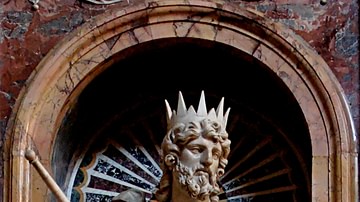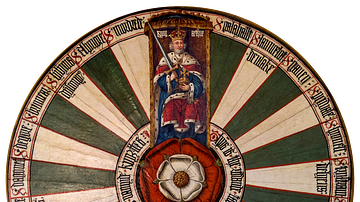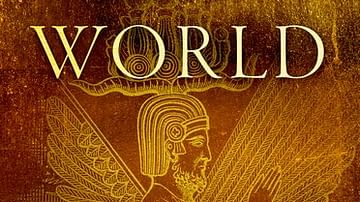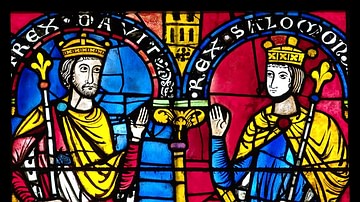Search
Did you mean: Ino?
Search Results

Image
King Stephen of England, York Minster
A detail of the sculpture of King Stephen of England (r. 1135 - 1154 CE) from the Quire's Screen (also known as the Choir's Screen or the King's Screen) in York Minster. The Screen was created in the 15th Century CE, and portrays every English...

Image
King David
A statue of King David, second king of the ancient United Kingdom of Israel during the 10th century BCE. (By Nicolas Cordier, Borghese Chapel, Basilica di Santa Maria Maggiore, Rome)

Image
King Arthur's Round Table, Winchester Castle
A round table hanging in Winchester Castle, made in the style of the legendary King Arthur's table. The table from Winchester was originally created in the 13th Century CE during the reign of Edward I of England (r. 1272 - 1307 CE). The table...

Image
King John
Face reconstruction of King John of England (also called John Lackland, r. 1199-1216), based on his tomb effigy in Worcester Cathedral and contemporary chroniclers describing his physical appearance. During his reign, he lost the Duchy of...

Interview
Interview: King of the World by Matt Waters
In this interview, World History Encyclopedia sits down with author Matt Waters to chat about his new book King of the World: The Life of Cyrus the Great published by Oxford University Press. Kelly: Can you tell us a bit about your book...

Image
King Arthur, English Manuscript
Miniature of King Arthur, holding a spear and a shield emblazoned with the Virgin and Child. 14th-century CE manuscript from England. Peter of Langtoft and others: Drawings with various inscriptions, distichs and poems (ff. 1-9v), verse...

Image
King Arthur, Winchester
King Arthur at the Great Hall, Winchester.
16th-century painting of King Arthur on the Round Table, believed to bear the face of Henry VIII who commissioned the repainting.

Image
King Arthur by C.E.Butler
A depiction of King Arthur by Charles Ernest Butler (1864-1933)

Image
King John of England
A portrait of King John of England (r. 1199-1216 CE) from the National Portrait Gallery in London. The portrait was created by an unknown artist c. 1597 - 1618 CE. Oil on panel 578 mm x 451 mm (22 3/4 in x 17 3/4 in).

Image
King David & Solomon
A 12th century CE stained glass window depicting King David of Israel and his son and successor Solomon. Strasbourg Cathedral, France.